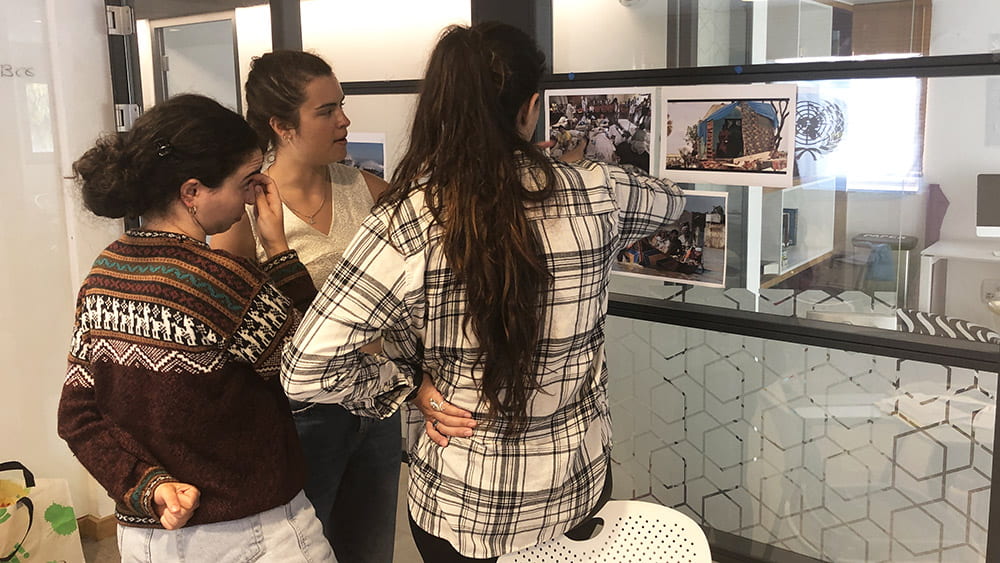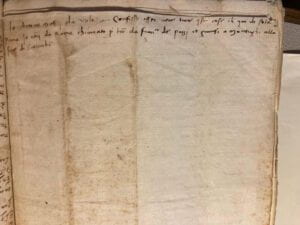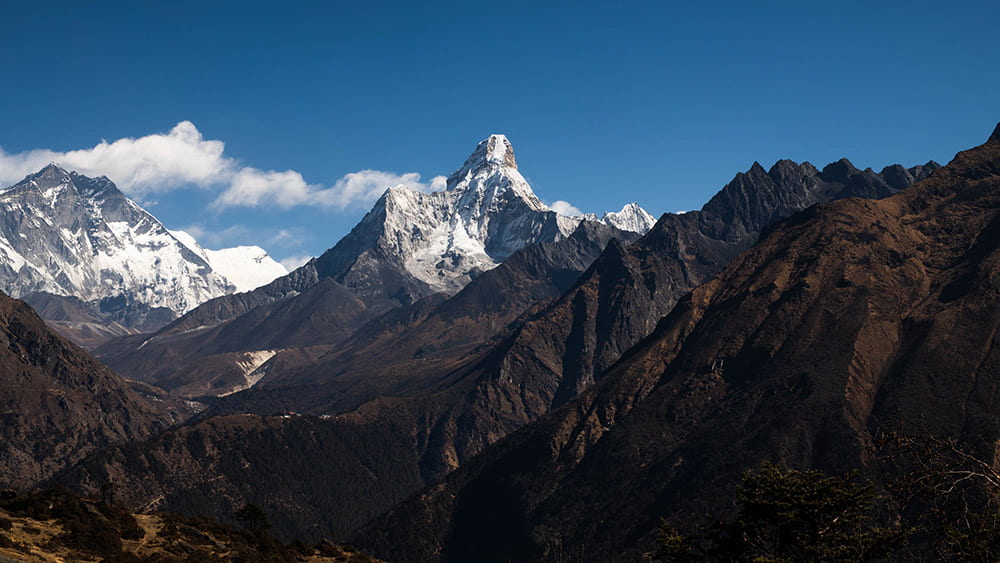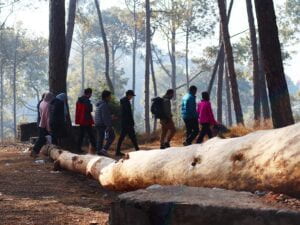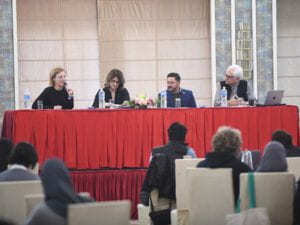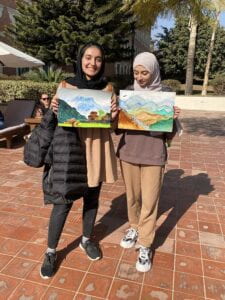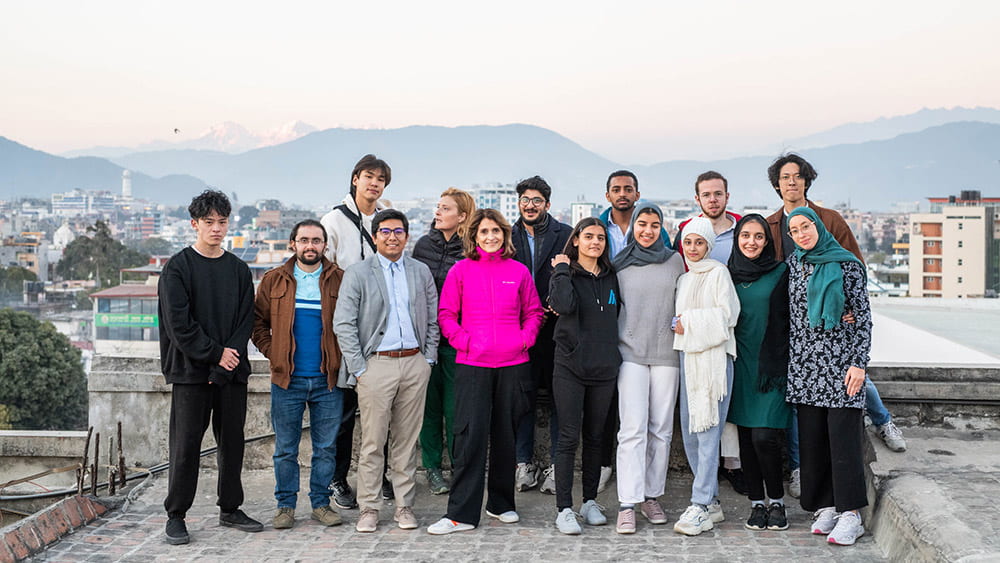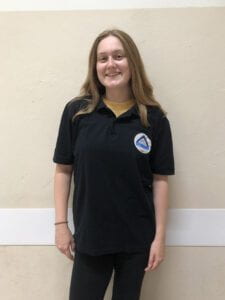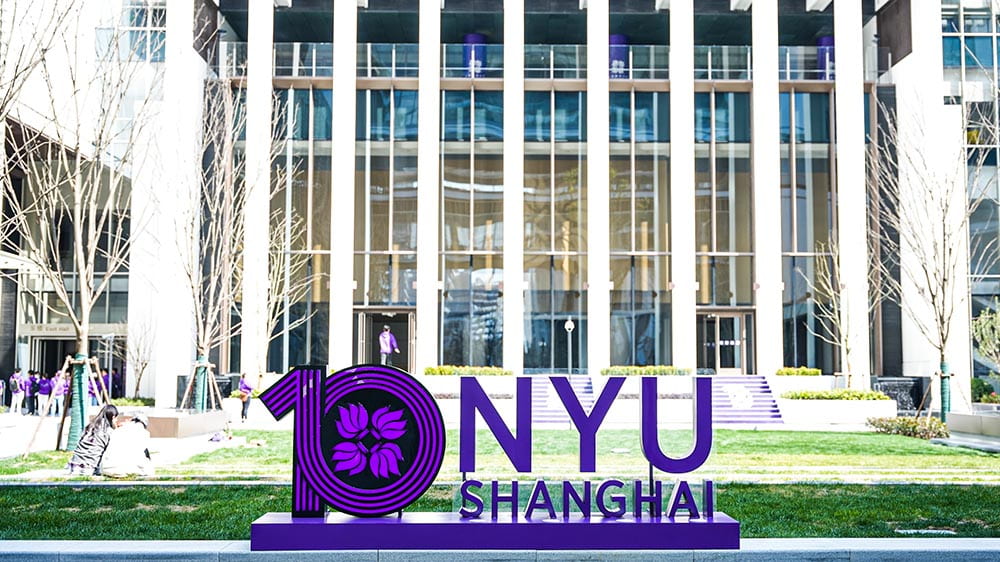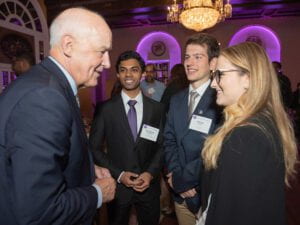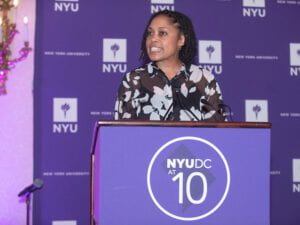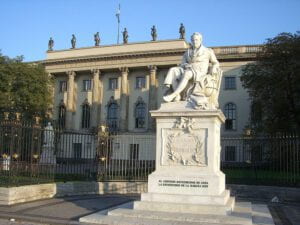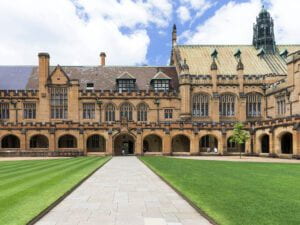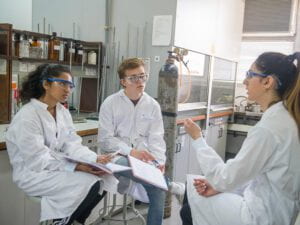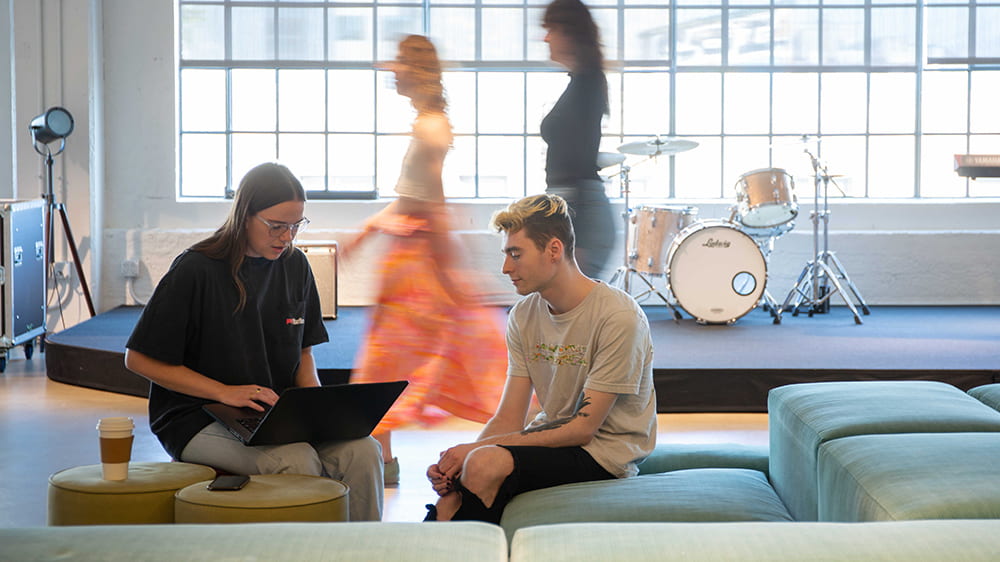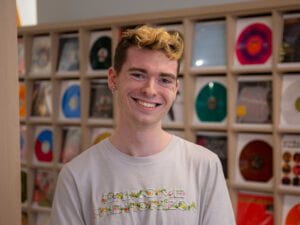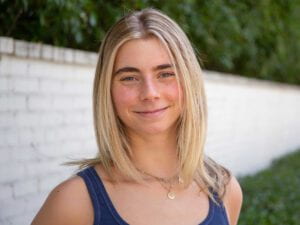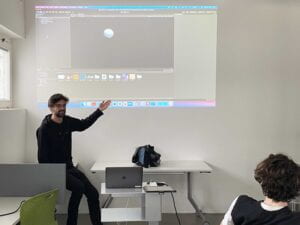Angel, a junior majoring in Politics with a minor in Business of Entertainment, Media and Technology, and Mariajose, an NYU alum, share their experiences at NYU Los Angeles. Their stories especially focus on the required internship component that is designed to enhance classroom learning and prepare students for careers in entertainment and media.
NYU Wordpress Theme
Academics
NYU Tel Aviv Welcomes a Simulation That Prepares Students for the Next Global Public Health Emergency
In a humanitarian crisis, the World Health Organization’s Strategic Health Operations Centre (SHOC) in Geneva, Switzerland, leads the response and offers coordination, information, monitoring, and other critical services and resources to the international community. At NYU Tel Aviv, Dr. Inon Schenker provides a unique opportunity for students to gain experiential understanding of SHOC through the War on Epidemics simulation. First launched by Dr. Schenker at Ben-Gurion University of the Negev, the simulation has been a training ground for hundreds of students at Israeli universities. Now at NYU Tel Aviv, the War on Epidemics is part of the course Epidemiology for Global Health, though Schenker welcomes any students eager to participate.
Realistic Scenarios Bridge Theory and Practice
In a room modeled on the SHOC’s setup, students work together to develop real-time responses to an unfolding crisis. This year’s simulation was based on the 2004 tsunami that devastated over a dozen countries in Southeast Asia. Students were briefed with real footage, then charged to consider emerging issues like sanitation, care for the injured, information communications, and the potential for the displaced populations to experience health risks such as infectious diseases, mental health conditions, and trauma. As the simulation progressed, the team was notified that a group of 1,000 young people were trapped on a mountain without shelter or food. Throughout the simulation these scenarios were on the clock, giving students a sense of real-life urgency.
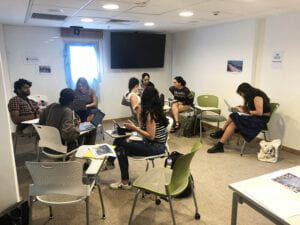 During the simulation, Ansley Fiorito, a Biology and Global Public Health major, was the UNICEF adviser on youth in emergency situations. She describes learning how operation centers support teams on the ground through their ability to take a different perspective on the situation. “Both roles are valuable, but when you’re in the midst of chaos, it can be challenging to make decisions that benefit everyone in the long run.” Sejal Porter, a Biology and Global Public Health major on the prehealth track, echoes the importance of a variety of experts. “As an epidemiological adviser, my role was to prevent a future threat of disease instead of focusing on the current, pressing impacts of the crisis.” Ansley adds, “It was incredible to see everyone work together toward a common goal.”
During the simulation, Ansley Fiorito, a Biology and Global Public Health major, was the UNICEF adviser on youth in emergency situations. She describes learning how operation centers support teams on the ground through their ability to take a different perspective on the situation. “Both roles are valuable, but when you’re in the midst of chaos, it can be challenging to make decisions that benefit everyone in the long run.” Sejal Porter, a Biology and Global Public Health major on the prehealth track, echoes the importance of a variety of experts. “As an epidemiological adviser, my role was to prevent a future threat of disease instead of focusing on the current, pressing impacts of the crisis.” Ansley adds, “It was incredible to see everyone work together toward a common goal.”
Dr. Edan Raviv, assistant director of academics at NYU Tel Aviv, notes that experiential learning is an important bridge between intellectual and practical knowledge. “This is especially critical in a field like public health,” he says, “which requires students to understand complex technical science on the one hand and the public, socioeconomic, and political causes and implications of public health on the other.”
When Learning Leads to Impact
Simulations like these can even transform future, real-time outcomes. Dr. Schenker offers one illustrative example: In 2015 a cyclone was approaching Chennai, India, the hometown of one of his former Ben-Gurion University of the Negev students, Sri Janani. Having participated in the War on Epidemics simulation just a few months earlier, Janani knew how to organize an operations center and bring together members of her community and local nongovernmental organizations. Through the spread of information, organization of supplies, and evacuation of those in vulnerable areas, Janani estimates they helped over 170 families.
Dr. Schenker anticipates the next War on Epidemics simulation at NYU Tel Aviv will run in the spring of 2024. “Every NYU student can benefit from participating in a simulation like this. It is highly educational but also a fun way to build real-life experience and skills,” he says.
Dr. Schenker is happy to work with NYU campuses and academic locations on adapting the simulation to their local contexts. His contact email is is2760@nyu.edu.
Written by Auzelle Epeneter
A Confession That Changes History: NYU Florence’s Marcello Simonetta Discovers New Twist in Pazzi Conspiracy
A newly found signed confession alters what historians thought they knew about one of history’s greatest conspiracies
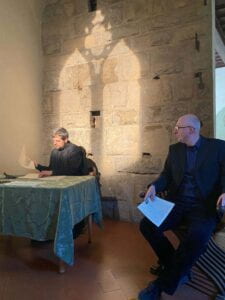
Marcello Simonetta, right, narrates a reenactment of the Pazzi Conspiracy at Florence’s Palazzo Vecchio on April 26, 2023, the 500-year anniversary of the event.
Had Antonio Maffei da Volterra successfully assassinated Lorenzo de’ Medici, the course of Italian history would have been altered immensely. The roots of the infamous Pazzi conspiracy to oust the Medici family as rulers of Florence ran deep—everyone from the pope to the king of Naples had a part in it. The failed conspiracy took place over 500 years ago this spring, and today, few people know more about it than NYU Florence instructor Marcello Simonetta. So when he uncovered a confession letter from Antonio Maffei earlier this year, unearthing details never known before of the attempted assassination, Simonetta was astounded.
“I’ve been around these materials for a long time. I know the story quite well. I even wrote a book about it,” says Simonetta. “This confession wasn’t supposed to exist, but it does, and it’s amazing.” Simonetta laughs when he says this, but then notes that distrust is the most important part of being a successful historian. He explains that you have to believe there is more to every story—that the historians who came before you didn’t finish the job and left something more to discover—even when you don’t know what that something is. And in this case, it is a confession letter written and signed by Antonio Maffei shortly before his death.
“It’s the last thing he wrote, because soon after writing the confession, he died,” says Simonetta, who found the confession at the Archivio di Stato di Firenze in a file of poems, wills, and other completely unrelated documents. “Archives are the treasures of our past. If you look close enough, you’ll find things that are unbelievable but true.”
In the confession Maffei shares a timeline for the planned assassination of the Medici brothers (Lorenzo, who was injured, and Guiliano, who did not survive). Unaware of his specific role in the assassination until the day before it happened, he wrote that he arrived in Florence months before April 26, 1478—the day the plot was to be enacted. This information contradicts what writer and philosopher Niccolò Machiavelli wrote in Florentine Histories, which is considered one of the most accurate accounts of the conspiracy. But just the existence of the confession—that Maffei even had time to write it—debunks the idea that he was beaten and hanged immediately after the attack.
“There are a lot of details about the preparation of the conspiracy, which we didn’t know before,” explains Simonetta. “But the bottom line is we had no idea that Antonio arrived seven months ahead of time. These are all incredible details that make it very real and very human. The failure of the conspiracy is astounding, but also the conspiracy itself, as Machiavelli points out among other things, is extraordinary.”
Simonetta is an expert on Machiavelli and teaches a class about him at NYU Florence. As a matter of fact, Simonetta made the discovery at the same time the class was reading Machiavelli’s On Conspiracies, specifically the section about the Pazzi conspiracy.
“The students had read the materials, but they didn’t know there was this new element that had just surfaced from the dust of the past, so I used it in the class,” Simonetta notes. “When I can, I love to use firsthand documents because it makes history so much more alive. And that’s what history is all about. It’s about imagination; without imagination it’s just data. It’s raw data, so who cares? But when history becomes living history, which is a pun—lethal history more than living in this case—it comes alive.”
Simonetta says that having the opportunity to bring history to life for his students has been one of his favorite parts about teaching at NYU Florence. Teaching in the city where these events took place, he adds, brings a dynamic to the classroom experience that is unobtainable anywhere else in the world.
“I’ve taught classes about Machiavelli in the United States, but it’s not the same as going to the Basilica di Santa Croce and seeing his tomb. Or going to the villa where he wrote The Prince,” Simonetta concludes. “It becomes so real: you can touch it, you can feel it exactly as it is. So being here, in Florence, is an enormous plus for my students and for me.”
Written by Kelly McHugh-Stewart
Students Confront the Water Crisis Through Experiential Learning in the Himalayas
All around us, there are signs the world is rapidly warming. But the Himalayas, which experiences floods and avalanches that could plunge the 2.5 billion people who rely on the mountains for freshwater into crisis, is a region under constant threat. Now, as part of NYU Abu Dhabi’s eARThumanities research initiative, the Geopolitics and Ecology of Himalayan Water (GEHW) project seeks to address the multitude of challenges the Himalayas encounters due to climate change.
This winter two January Term (J Term) classes—The Media, Climate Change and Other Calamities and The Himalayas: Geopolitics and Ecology of Melting Mountains—explored the environmental, geopolitical, and cultural implications of climate change. After learning about the subjects in the classroom, students flew to the Nepal Himalayas to witness these changes directly and begin to work toward solutions.
“The trip itself was the highlight of the J Term because students were asked to travel as scholars and researchers, not as tourists,” says Sophia Kalantzakos, the founder of eARThumanities and Global Distinguished Professor of Environmental Studies and Public Policy. “We had a vast array of different experts who came to speak to us about the issues at hand, but we also wanted the students to fall in love with the mountains and the region. We had an opportunity to use all our senses in ways you’re not able to when stuck in a classroom.”
In Nepal NYU Abu Dhabi students combined scientific research and conferences while also immersing themselves in culture and place. Research affiliate and GEHW founding member Rastraraj Bhandari, NYU Abu Dhabi Class of 2019, adds, “The foundational thing that students were able to gather is how the climate crisis and the water crisis impact every sector and every field. It’s deeply rooted in how we live. Incorporating the humanities into understanding a scientific problem allows us to humanize the crises.”
For Sophie Pfisterer, a first-year student interested in film and sustainability, the experience was life-changing. “It was a combination of everything I was interested in, and the trip itself was just incredible because I felt like I connected with one of my passions every day,” she says. One day they visited a farming initiative seeking environmentally friendly and culturally sensitive solutions to improve the quality of life in alpine villages. The next day, they attended a conference with experts including the British ambassador to Nepal, a filmmaker, the CEO of the World Wildlife Fund Nepal, and an ornithologist. “It was this incredible way of learning so much because it meant something to me and I knew I’d use it. That’s different from learning something for a test. With that—once you’re done—you lose that information because it doesn’t mean anything to you.”
Federico Jannelli, a recent graduate who majored in Economics and minored in Arabic, traveled to Nepal to better understand the multidisciplinary ramifications of the crises. “As an Economics major, it was interesting to understand more about the strong economic relationship and financial links between Nepal and the United Arab Emirates,” he explains. “Professor Kalantzakos did a great job linking the concerns of the various stakeholders. She highlighted the need for cooperation. We urgently need to tackle these problems, but the solution isn’t just to have high-ranking diplomats and politicians sit at a roundtable and discuss solutions. We need to involve people who are experiencing the consequences of these crises every day.”
A Universal Language at Every Age
Through internships, volunteer opportunities, and class projects, NYU study away students can make a positive impact on the children in their local communities while also gaining valuable, real-world experience they can apply to their future careers.
While studying at NYU Prague last spring, Joey Duke, a junior majoring in Music Education at the NYU Steinhardt School of Culture, Education, and Human Development, found there is more to his field of study than he could have imagined. Through the class Foundations of Music Education led by Professor Klára Boudalová, he had the opportunity to work with the Prague Symphony Orchestra to help make classical music accessible to children in the Czech Republic.
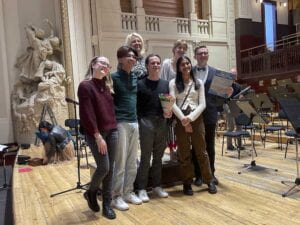
Concert planners and participants pose for a photo onstage at Smetana Hall after the orchestra performance. Pictured from left to right are: Jaime Patterson, Jair Gonzales, director Klara Boudalova, Joey Duke, actress Veronika Kubarova, Jahnvi Seshadri, and conductor Jan Kucera.
“We worked on the Orchestr na dotek, which means ‘the orchestra to listen,’” Joey says. After a semester of learning from the orchestra, the class’ final project was to organize an orchestra completely on their own. “It’s their program created just for young audiences, and it was a game changer for me. It showed me there’s a lot more you can do with music education.”
Joey and his classmates “took a part in everything” when it came to creating the orchestra. They chose composers, selected and cut the music, wrote a storyline, and worked with the musicians and performers to ensure the performance went off without a hitch.
“We knew we would be these kids’ first impressions of the composers, and we wanted to make sure we selected the right pieces and cuts,” explains Joey. Their orchestra focused on the works of Claude Debussy and Maurice Ravel, which they intertwined with a story about pirates. “The music really couldn’t be more than three minutes at a time, so we had to select the most important parts. That took a lot of score reading and musical knowledge. Then for the story, Debussy features a lot of ocean music and Ravel features a lot of Spanish music, so we were like, ‘We’ve got it! We’re getting on a ship, we’re venturing across the sea, we’re going to islands.’ It was this big, fantastical process, and once we got past the blank canvas, the possibilities were endless.”
Similarly, at NYU Florence, Anika Istok, a junior majoring in Psychology at the College of Arts and Science and minoring in both Italian Studies and Child and Adolescent Mental Health Studies (CAMS), had the chance to connect with children through music.
“Music is so important for kids,” says Anika who spent the fall of 2022 volunteering with NPM Bambini in Movimento, an organization that provides support, therapy, and inclusive recreational activities for children, adolescents, and their families to help improve their health and wellness. “It’s an important way for kids to express themselves, especially if they’re nonverbal, shy, or don’t initiate interactions. It’s amazing because, through something simple like playing our community drum together, they were able to bond in a way that, even with words, you can’t accomplish.”
Volunteering with NPM Bambini in Movimento was fulfilling for Anika on multiple levels. It not only advanced her work in psychology and CAMS but also helped her become fluent in Italian. She noted volunteering as part of the culture at NYU Florence, so she knew she would get involved somewhere. Still, it was important for her to find an organization where she could really make an impact, and at NPM Bambini in Movimento, she was able to do just that.
“We weren’t necessarily teaching music; rather, we were experiencing music together,” Anika adds. Anika helped teach two after-school classes, one for children between 2 and 5 and one for children between 6 and 8 years old. “A lot of the kids we worked with had either a disability or some sort of special need, and a lot of them were too young to be in school full time or had some trouble in school. Connecting with them outside of their normal educational environment was really important.”
Both Joey and Anika returned to New York City after their semesters away with newfound knowledge and appreciation for their selected fields of study. “This opportunity showed me that I could not only aspire to do something like this but do it. And then we watched it happen,” says Joey. “At the end of the day, music is who we are as a people. It carries all of our cultural meaning, it carries a message, and for kids to understand the music from where they are is for them to participate in their communities. For me, I realized there’s so much more we can do. That semester really opened my eyes to the impact we can make through music.”
Written by Kelly McHugh-Stewart
10 Years in Two Dynamic Cities
During this academic year, two NYU global locations arrived at an important milestone: 10 years as part of the NYU global community. NYU Shanghai and NYU Washington, DC, celebrate their accomplishments of the last decade.
NYU Shanghai
Last month, NYU Shanghai, one of NYU’s three degree-granting campuses, celebrated its 10th anniversary, beginning with a ceremony held on the school’s newly opened New Bund campus. Guests included founding partners from NYU’s New York City campus and East China Normal University as well as local government officials. NYU’s President Andrew Hamilton took the opportunity to reflect on the important role academic research plays in cultural democracy:
NYU Shanghai has blossomed into a thriving, remarkable university whose international faculty and student body epitomize NYU’s innovation and ambition. It is not only an important part of NYU, but the research and learnings that faculty and students take part in contribute enormously to cultural understanding across the globe. (NYU Shanghai News and Publications)
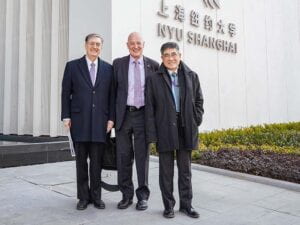
(pictured from left to right) Vice Chancellor of NYU Shanghai Jeffrey Lehman, NYU President Andy Hamilton, NYU Shanghai Chancellor Tong Shijun
The ceremony was the first in a series of events celebrating the momentous anniversary. For example, Visiting Professor of Music and Composition and Distinguished Artist in Residence Bright Sheng conducted the concert, The Friendship of Two Cities: Shanghai–New York, featuring pianist Ming Xie and violinist Kelly Hall-Tompkins. Two pieces were carefully curated for the program, “Butterfly Lovers’ Violin Concerto” and “Rhapsody in Blue,” to represent Shanghai and New York City. The weekend also marked NYU Shanghai’s first-ever alumni reunion, and over 200 alumni attended celebratory and networking events including an alumni panel discussion and the Dean’s Open House and Faculty Salon.
NYU Shanghai’s student body president Stephanie Anderson ’23 and vice president Peirong Li ’24 gave inspiring remarks at the opening ceremony, encouraging students to bring positive change to the world: “Let us in true NYU Shanghai fashion, rise to meet the challenges of our new, post-pandemic world and contribute to empower our community.”
NYU Washington, DC
Celebrations for the 10th anniversary of NYU Washington, DC, one of the University’s global academic centers, began last fall with a reception for over 200 DC-based alumni. President Hamilton provided the keynote address and current students studying at NYU Washington, DC, joined the celebratory reception. The site also launched an inaugural film series with the theme Empire. Each month, a film related to the theme is screened at the Abramson Family Auditorium, followed by a discussion with a faculty moderator. The theme and related films provide an opportunity for students to reflect on the complexities inherent in history as well as international relations and politics today, taking advantage of the site’s location on the doorstep of international diplomacy.
Director Kari Miller attributes the site’s success to several factors, including the Constance Milstein and Family Global Academic Center’s incredible facility and its central location downtown. Offering students the chance to take courses near the White House and the National Mall, the center’s proximity to a multitude of government agencies and organizations provides ample opportunities for students to gain practical experience through internships.
And what does Miller hope the next 10 years bring to NYU Washington, DC? “We hope to elevate the visibility of NYU Washington, DC, among our faculty and students at all degree-granting campuses, so that the site provides access to all of the teaching, learning, meeting, and research opportunities available in Washington, DC.”
NYU Affiliations Around the World: A Robust Network for Research and Study
Students not only gain perspective and knowledge from time spent away from their home campus but also benefit from NYU partnerships with local institutions in the University’s global network. With one partnership that began before the global site itself was founded and another established over 50 years ago, it’s clear these relationships are invaluable to NYU research, scholarship, and community.
NYU Berlin
NYU Berlin’s first agreement with Humboldt-Universität zu Berlin was in 1995, and the partnership remains as strong as ever. Today, students can enroll in courses at Humboldt and access its library. In addition to its partnership with Humboldt-Universität, NYU Berlin has an impressive record of establishing—and continuing—student and faculty exchange programs with other German universities. For example, in 1995 NYU established an agreement with the Freie Universität Berlin. Over 20 years later, in 2019, Freie Universität hosted Radha S. Hegde, NYU professor of media, culture, and communication, as the Dahlem International Network Professor in Gender Studies to teach two seminars.
NYU London
Before NYU London was established in 1999, the University held a partnership with the Royal Academy of Dramatic Art (RADA) for NYU Tisch School of the Arts students. Even as course offerings and programming expanded into the NYU London we know today, that relationship has remained steadfast for over 20 years. Each semester, a small group of NYU students audition for placement in RADA’s Shakespeare in Performance program. Students learn all aspects of performing Shakespeare as they work with a variety of RADA instructors. The intensive program culminates with the performance of one of Shakespeare’s plays. A more recent partnership with the National Film and Television School was established in 2018, with the first NYU students taking Directing the Actor: London in 2019. At the end of the course, students shoot and direct professional actors on a soundstage.
NYU Paris
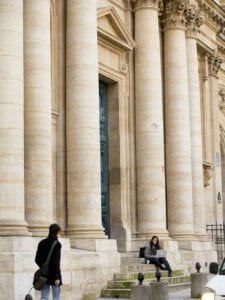
The Sorbonne building houses various Parisian universities including the Université Paris 1 Panthéon-Sorbonne
Over the years, NYU Paris has established a number of agreements with local universities, including Université Paris 1 Panthéon-Sorbonne, Université Paris Cité, Université Sorbonne Nouvelle, and Université Paris Sciences et Lettres. These agreements allow NYU Paris students to take courses at these institutions, while Paris-based students have the opportunity to study at NYU’s campus in New York City. The relationship between NYU and Université Paris 1 Panthéon-Sorbonne dates back to the founding of NYU Paris in 1969. Currently, the agreement allows NYU Paris students with advanced proficiency in French to take Paris 1 Panthéon-Sorbonne classes in subjects ranging from art and history to philosophy and mathematics. In addition, the University’s partnership with Université Sorbonne Nouvelle dates back almost as long—to 1975. Eligible NYU Paris students can take courses there in literature, cinema, theatre, and media studies.
NYU Sydney
In November 2021 NYU established a new partnership with the oldest university in Australia, the University of Sydney (USYD). Through the partnership, NYU Sydney students have all the benefits of being a full-time USYD student: living on campus, enrolling in USYD courses, and participating in the Industry and Community Projects Units (ICPUs). ICPUs pair students with an industry partner and academic lead to work on real issues that industry, community, and government organizations encounter. And the partnership benefits are reciprocal—USYD students have the opportunity to enroll in Sydney-based courses taught by NYU instructors or spend a semester abroad at NYU’s campus in New York City or one of NYU’s global academic sites.
NYU Tel Aviv
A partnership with Tel Aviv University (TAU) further enriches students taking science courses at NYU Tel Aviv. TAU, Israel’s largest university, is just a short distance from the NYU global academic center. While NYU Tel Aviv offers science courses, including Organic Chemistry II and General Physics II, TAU offers the lab sections for those courses.
In addition, undergraduate students can intern in a research lab through NYU Tel Aviv’s biology internships at TAU. Depending on the type of research conducted at each lab, students may learn different techniques like cell culture, gel electrophoresis, and microscopy. During the internship, students take part in the experimentation, research, and writing processes with at least one PhD student. What’s more, TAU students can also take advantage of NYU’s resources in return by enrolling at one of the University’s global academic sites for a semester.
No Business Like Show Business: Internships at NYU Los Angeles
While attending NYU Los Angeles, students from across the University enroll in the Experiential Learning Seminar. Taught by entertainment and media industry professionals, the seminar focuses on key areas like production, business, and criticism. A requirement of the NYU Los Angeles program, the seminar pairs classroom learning with real-world experience to integrate professional development and relevant research and debate and expand students’ understanding of how these industries work.
Discovering New Aspirations
Sean Kelly, a Music Business major and recording artist, has always been interested in the arts. In his first year at NYU, he fell in love with the business side of the industry while learning about record contracts and royalties. He knew NYU Los Angeles was the right place to augment his academic work with professional experience. As soon as Sean was admitted to the program, he applied for internships at his dream companies, one of which was the Warner Music Group. Atlantic Records, a label under Warner Music Group, hired him, and he was thrilled to be a sales and streaming intern.
Sean worked with various departments to ensure projects were ready for release and tracked streaming performance across channels. “Sitting in meetings gave me the scoop on how different departments function,” he says. “Communication and flexibility are huge skills to have in the music industry, and they’re ones I developed on the job.”
The internship reinforced Sean’s love for the music industry, but it also taught him about new positions and departments he didn’t know existed. “I definitely have new aspirations because of my deeper understanding of how labels operate,” he says. “I left LA with new career prospects and goals as well as completely new passions and interests.”
Building a Network
Margo Resnik, Tisch School of the Arts Class of 2022, majored in Cinema Studies and knew she wanted to work in the film industry. But she also craved a role that would include analysis and history. After transferring from a community college in Santa Monica, CA, to NYU, she spent a year in New York City and then realized NYU Los Angeles would be a better fit for her goals: to be close to the film industry and graduate early.
Finding an internship in the competitive Los Angeles market wasn’t easy, but Margo credits NYU Los Angeles with making the process as smooth as possible. “They have a running list of new and upcoming postings that is updated daily, and they use every connection they have to help introduce you to different companies and people,” she says. Margo’s hard work and patience paid off when Artist Publishing Group hired her as a marketing intern last fall. During the internship, Margo learned many practical skills, but the relationships she formed were more important to her. “My boss was so incredibly helpful,” she says. “I’m still in contact with him, and he regularly reaches out to see how I am doing and provide me with leads for potential jobs. The entire experience has shown me there are people in this industry who truly want to help you.”
Written by Kristin Maffei
Students Traveled to NYU Tel Aviv Through a Steinhardt Dean’s Global Honors Seminar
“The entire experience was really rewarding,” says Alice Hallock, a first-year Educational Theatre major at the NYU Steinhardt School of Culture, Education, and Human Development, about her trip to NYU Tel Aviv. “Everything we did was grounded in the course. We got to really explore the culture, but, in the end, everything came back to what we learned from the textbooks. It was amazing to see it all play out in a real-world situation—you don’t get that with other classes.”
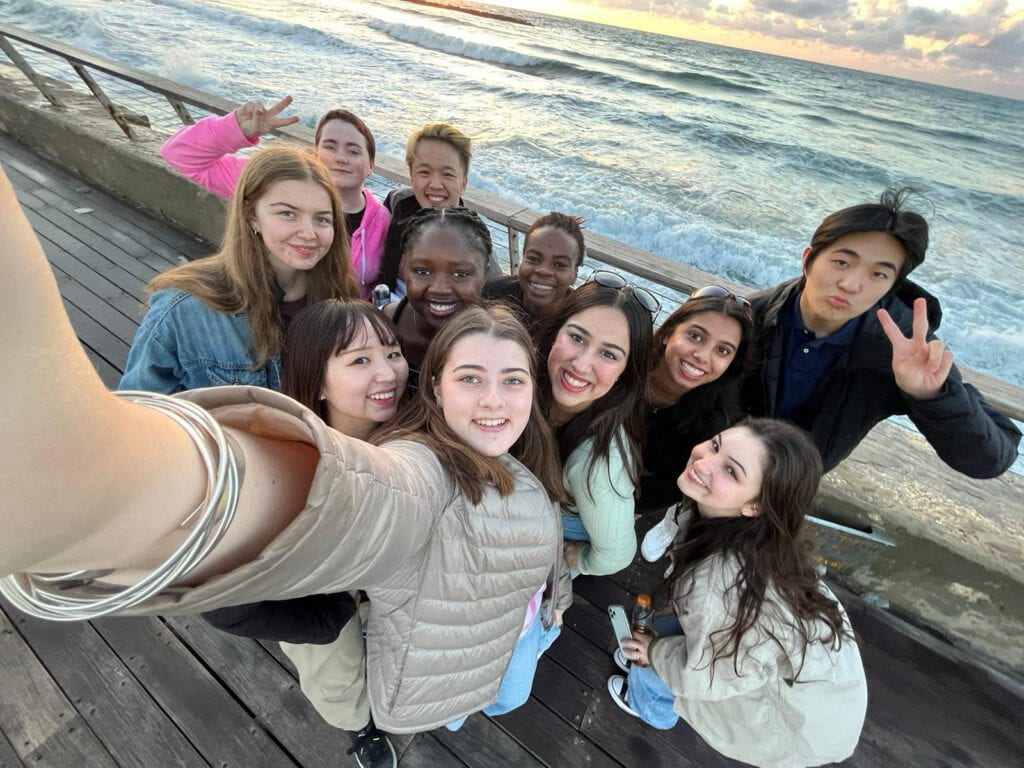
NYU Steinhardt Dean’s Global Honors Seminar students pose for a photo in Tel Aviv where their curriculum focused on families, schools, and child development came to life.
Established in 2012, the Steinhardt Dean’s Global Honors Seminars are semester-long, seminar-style courses that incorporate an international trip to one of 10 available NYU global academic centers. Open to first- and second-year students, the courses integrate a global perspective into the study of an interdisciplinary, liberal arts–based topic, from fashion and music to sustainability and biodiversity. Four seminars are offered every year—two in the fall and two in the spring—each focused on a different subject. This fall, NYU Steinhardt offered the course Families, Schools, and Child Development, where students traveled to Israel to experience their learnings in real time.
Families, Schools, and Child Development, led by Clinical Associate Professor of Applied Psychology Adina Schick, allows students to dive into readings, studies, and research projects throughout the semester. When the class arrived in Tel Aviv, it was as if their coursework came to life. The group spent each morning and afternoon of the trip visiting different schools in Tel Aviv and Jerusalem. They had conversations with both elementary and high school students and learned about the differences—and similarities—between their experiences.
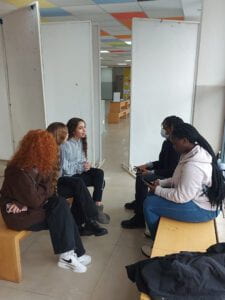
Debra Amata, majoring in Instrumental Performance, and Aaliyah Kamara, majoring in Applied Psychology, interview high school students at Jerusalem’s Mae Boyar High School international program.
“The class taught me a lot about noticing people of other cultures and not just celebrating them but really learning from them,” adds Alice. “It was impactful to talk to these kids then realize, ‘Oh, I went through this same exact thing.’ It opened my mind, and I know I’ll carry the trip and the conversations I had with me throughout my life, especially when I’m working with other children.”
Tiana Elavia, a second year at NYU Steinhardt majoring in Applied Psychology, went to elementary school in India and high school in the United States. According to Tiana, her personal experience in different educational systems and the opportunity to visit classrooms, talk to students, and learn about the Israeli educational system while on the class trip are what drew her to apply for the seminar in the first place. “The direct conversations we had with people, the hands-on work, that’s what I was looking for,” explains Tiana. “With this kind of trip, this kind of class, you get to talk to people about what they’re doing instead of just sitting in class reading an article. You get to be there yourself and ask your own questions.”
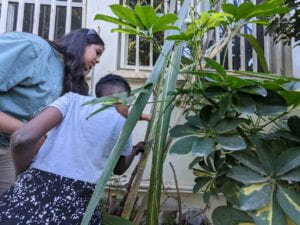
In Tel Aviv Applied Psychology major Mishal Shafique learns about an urban farming initiative with an elementary school student.
While second-year students are invited to apply to the Steinhardt Dean’s Global Honors Seminars, first-year students who meet a seminar’s specific requirements are invited to participate. The opportunity to travel their first year is often an appealing factor for deciding prospective students. The seminars give first-year NYU students a taste of what life is like at its global campuses and sites and, often, can be launching pads for future study away opportunities. “The biggest takeaway for me was just learning and thinking about how there are so many different people and ideologies, how there are so many things going on around the world that you just don’t know about,” says Tiana, who is making the most of NYU’s global opportunities and spending the spring semester at NYU Sydney. “This class really helped me broaden my horizons about different cultures, thoughts, and ideas.”
Written by Kelly McHugh-Stewart
Course Spotlight: Augmenting the Gallery, Theory and Practice with Augmented Reality at NYU Berlin
Combining his background as an educator, artist, and programmer, instructor Pierre Depaz’s NYU Berlin course Augmenting the Gallery makes use of his research on simulation and public organization through technological means to explore the overlap of the digital and the physical in museums.
“We use augmented reality technology to reveal some of the invisible knowledge threads that weave through a museum’s exhibitions, spaces, and publics,” says Depaz. “This allows us to look critically both at a new technology that pervades our devices and centuries-old institutions, sometimes in need of an update.”
Augmenting the Gallery offers students both a theoretical framework for understanding the museum space and the practical application and experience using new technologies like Unity (a game engine used to develop games and simulations) and prototyping tools like Figma and Adobe XD. Ultimately, students learn how to create relevant mobile content within a given exhibition through prototyping, iteration, and integration. More importantly, they are able to evaluate the advantages and disadvantages of augmenting technologies within cultural spaces and sensitively implement them using their acquired knowledge. Accessibility is a key theme in the course as students grapple with the question: How much does digital media provide access to knowledge and to whom?
“Berlin is particularly great in terms of the layers of history that are rendered visible across the city. From Prussian empires to refugee waves through the Holocaust and the Cold War, there’s many ways you can look at a particular place and many different stories told by each of these places,” says Depaz. “Additionally, the creative tech scene also exposes the students to cutting-edge new media art and exhibitions.”
Making extensive use of museums and galleries in Berlin, Augmenting the Gallery is a great academic example of how NYU’s global network enhances the student experience. Working closely with these institutions, students gain practical skills they can leverage with future employers while learning that “designing augmented reality is a lot more complex than what commercials promise,” says Depaz. Students also learn “how complex the job of a museum is if they want to uphold their mission.”
By learning to design and deliver immersive experiences that breathe new life into displays, using technology to challenge the more complicated and problematic aspects of exhibitions, and making the hallowed museum space accessible to the widest swath of people possible, students develop the skills they need to help uphold a museum’s mission and break barriers in Berlin and beyond.
Want a taste of Augmenting the Gallery?
Depaz recommends checking out what the Museum für Naturkunde in Berlin did with an augmented sound walk of their bird collection. He also cites “The Ignorant Art Museum: Beyond Meaning Making” by Emilie Sitzia as one of the course’s most popular readings. “It’s an article on how museums can help foster knowledge and provide agency back to their audience without keeping the posture of an elite ivory tower, sometimes facilitated by the use of digital technologies,” he says. “The class about how museums engage in education and, more broadly, what is good education is very fruitful—students always report their best learning experiences happening outside of museums (or outside of university, for that matter!).”
Written by Kristin Maffei
